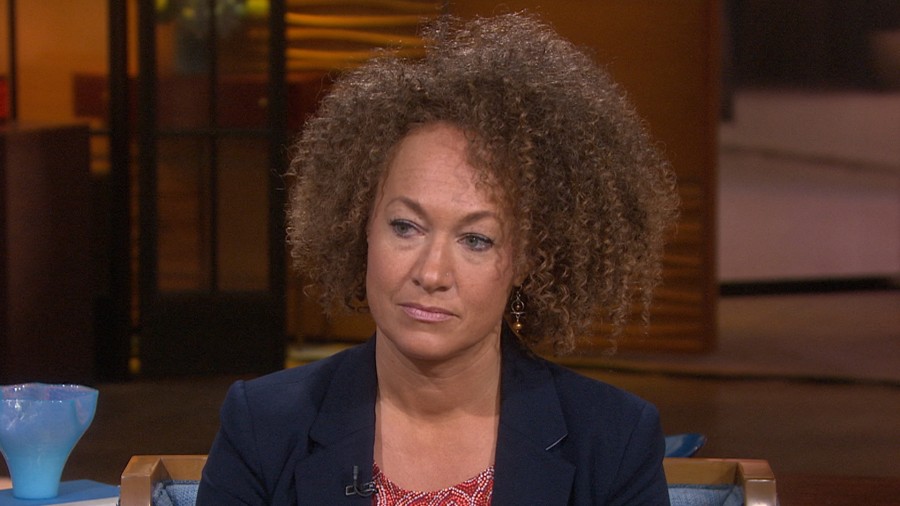At
the core of the bizarre Rachel Dolezal story appears to be a troubled woman who
wants attention. For that reason, I think we should soon stop giving it to her.
However, her 15 minutes aren’t over yet.
I
watched her interview
with Matt Lauer and was appalled too many times to count. First and foremost,
as regards her position that she is “human” racially, I would like to retort, isn’t that a lovely thought! Tell that to
the black person who was just called the n-word or pulled over for driving
while black. While we are all, indeed, members of the same human race, the
idea that Dolezal can be “racially human,” given that she has been masquerading
as a black woman, is incredibly insensitive to actual black people—you know, those people Dolezal supposedly
identifies with and advocates for—who,
unlike her, will never have the option of shedding their skin and identifying
as another race.
In
addition, I found her choice of words in answering Lauer’s questions
fascinating. She took responsibility for nothing. Instead, she chose to paint
herself as a passive agent. Others identified her as biracial or black, and in
all instances, she just didn’t correct them; she met an older black man with
whom she connected, so he just became her father; she “[doesn’t] avoid the sun”
and therefore her skin is darker than it used to be… If Dolezal really cared
about her work with the NAACP, she would have owned up to misrepresenting
herself and apologized to the people she might have hurt.
Interestingly,
Dolezal claimed that she has “identified with the black experience” since she
was about five years old, when she would allegedly draw herself with brown skin
and black curly hair, as opposed to her pale skin and blonde hair. That explanation
sounded contrived to me. What awareness does a five-year-old—especially a white
five-year-old—have of the “black experience”? Maybe she was creative; maybe
family members told her she was ugly, so she envisioned herself as someone else;
or maybe she just made this up.
If,
indeed, Rachel Dolezal has self-identified as black since the age of five, why
did she assert her whiteness to accuse Howard University of discrimination in
her 2002 lawsuit?
Furthermore,
if this story is simply about a woman who loves her black family members and is
passionate about equality and aligns herself with the African American
community, why try so hard to pass as black? The number of hate
crimes that Dolezal alleged, with no corresponding evidence presented to police,
might suggest that she wanted so much for people to see her as black that she
invented a struggle that was not her own, but that is very real to black
people.
It
seems that Rachel Dolezal was trying to construct her own victimhood. But why?
Is this a sign of mental illness? Desperation to validate her invented
blackness? A need for attention? Whatever the reason, the reality is that by
making false accusations about being the victim of crime, she was trivializing
the real experiences of people who have been harassed and threatened due to
their skin colour.
But
this is the crux of this insane story. Dolezal’s dishonesty is insulting and
dismissive. Rather than asserting her position as an ally and trying to fight
injustice and inequality, basically, she got a tan, got her hair done, and
spoke on behalf of black people.
Being
white, black, aboriginal, Asian, etc. is not a choice that an individual makes.
Yes, race is a construct, but that doesn’t mean that people construct it for themselves.
I heard Dolezal use the word “transracial” in her interview moments after I said
to someone, “I wouldn’t be surprised if she tries to start some sort of ‘transracial’
movement.” Am I right? Many people on social media have likened this story to
Caitlyn Jenner’s and asked if someone can be transgender, why can’t another
person be transracial? Kat
Blaque replies brilliantly to this question. Transgender people are being
true to themselves and taking a tremendous risk in doing so, whereas Rachel
Dolezal was deceiving people and benefited from it.
While
she would have the world believe that she represents either blackness or the
fluidity of race, in fact, what Rachel Dolezal represents is white privilege. Dolezal has proven that she has the luxury of either claiming or
abandoning blackness whenever it feels right to her. How many people of colour
have the same option?
It
is bad enough that this woman took it upon herself to hijack someone else’s
narrative. She did the right thing by resigning. We cannot allow her to resume
what she did with the NAACP by writing some new narrative of transracialism
that dismisses the reality of living in black skin.

No comments:
Post a Comment
Note: Only a member of this blog may post a comment.